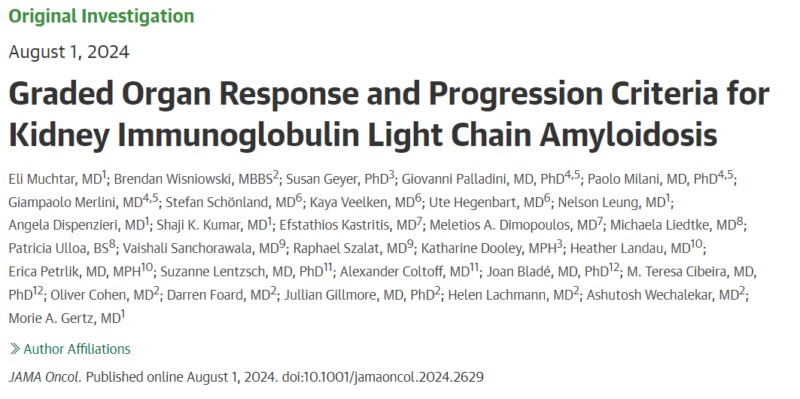Robert Orlowski shared on X:
“Myeloma Paper of the Day: Graded organ response and progression criteria for kidney immunoglobulin light chain amyloidosis offer clinically and prognostically meaningful information for treating patients with renal AL amyloidosis.”
Source: Robert Orlowski/X
Graded Organ Response and Progression Criteria for Kidney Immunoglobulin Light Chain Amyloidosis
Authors: Eli Muchtar, Brendan Wisniowski, Susan Geyer, Giovanni Palladini, Paolo Milani, Giampaolo Merlini, Stefan Schönland, Kaya Veelken, Ute Hegenbart, Nelson Leung, Angela Dispenzieri, Shaji K. Kumar, Efstathios Kastritis, Meletios A. Dimopoulos, Michaela Liedtke, Patricia Ulloa, Vaishali Sanchorawala, Raphael Szalat, Katharine Dooley, Heather Landau, Erica Petrlik, Suzanne Lentzsch, Alexander Coltoff, Joan Bladé, M. Teresa Cibeira, Oliver Cohen, Darren Foard, Jullian Gillmore, Helen Lachmann, Ashutosh Wechalekar and Morie A. Gertz.

Other posts featuring Robert Orlowski on OncoDaily.
Robert Orlowski, M.D., Ph.D., holds multiple positions at The University of Texas MD Anderson Cancer Center, including Chairman, Ad Interim Director of Myeloma, and Professor of Medicine in the Departments of Lymphoma/Myeloma and Experimental Therapeutics within the Division of Cancer Medicine. Additionally, he chairs the SWOG Barlogie/Salmon Myeloma Committee, which is part of the National Clinical Trials Network, dedicated to advancing new therapies and understanding the biology of myeloma.
Dr. Orlowski’s expertise lies in both clinical practice and scientific research, with a particular focus on translating laboratory discoveries into effective treatments for patients. He investigates drug resistance mechanisms in myeloma and seeks to identify predictive biomarkers for treatment response. Notably, his past contributions include leadership roles in developing proteasome inhibitors like bortezomib and carfilzomib, as well as monoclonal antibodies such as daratumumab and elotuzumab.


